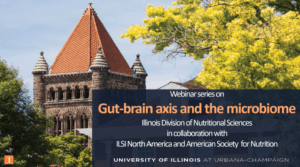Synopsis of the Gut-Brain Axis and the Microbiome -- ILSI-North America and Division of Nutritional Sciences, University of Illinois
Washington, DC, Webinar
September 25, 2020
Virtual

August 28th
Professor Rodney Johnson, PhD, University of Illinois at Urbana-Champaign
Introduction to a webinar series on the gut-brain axis and the microbiome (5 – 10 min).
Professor Jeffrey Woods, PhD, University of Illinois at Urbana-Champaign
Doctoral student Noah Hutchinson
Title: “Exercise, Diet and the Gut-Brain-Axis.”
Summary:
There is currently much interest in the gastrointestinal microbiota and its modulation as it relates to implications for host health. A notable aspect is the bidirectional communication between the gut microbiota and brain, referred to as the gut-brain-axis. Nutritional interventions have powerful effects on the gut microbiota but another significant and often overlooked factor is the influence of physical activity. Join Dr. Jeff Woods and his doctoral student Noah Hutchinson as they review evidence and past work regarding the influence of exercise and diet on the gut microbiome and its potential to regulate the gut-brain-axis.
Questions and Dialogue
View the recording here.
September 3rd
Professor Kelly Swanson, PhD, University of Illinois at Urbana-Champaign
Title: “Sex-Related Differences in Host Metabolism and Health: Role of the Gastrointestinal Microbiome”
Doctoral student Celeste Alexander
Title: “Metabolic and Gastrointestinal Health Perturbations Following Cholecystectomy in a Model of Menopause”
Summary: Sex hormones have a strong impact on the risk of obesity, metabolic syndrome, gastrointestinal disorders and many other diseases, with men and postmenopausal women having a greater risk than younger women. Similar phenotypic changes and risk of disease have been demonstrated following the surgical removal of ovaries in animal models. Although all mechanisms and relationships are not yet understood, the gastrointestinal microbiota are known to be different between the sexes, metabolize endogenous and exogenous estrogenic compounds, and impact host health. Join Dr. Kelly Swanson and his doctoral student Celeste Alexander as they review evidence and past work regarding the relationships that exist between sex, the gastrointestinal microbiota and metabolic diseases, with specific emphasis on cholecystectomy.
Questions and Dialogue
View the recording here.
September 11th
Professor Yanina Pepino, PhD, University of Illinois Urbana-Champaign
Doctoral student Clara Salame
Title: “Low Calorie Sweeteners: Treat or Trick?”
Whether low-calorie sweeteners (LCS) are bioactive compounds that can affect health is an issue of much public health and scientific debate. Data from several studies suggest that high consumption of LCS is associated with the same metabolic diseases as high consumption of added sugars, including an increased risk of developing type 2 diabetes. Although mechanisms for such association are incompletely understood, and reverse causality is likely, the recent discovery of metabolic signaling via sweet taste receptors in the gastrointestinal tract and the effect of some LCS in the gut microbiota provide a biological framework for the possibility that LCS could have “post-oral” effects via gut-brain axis (via both humoral and neural pathways). Join Dr. Pepino and her doctoral student Clara Salame as they review evidence and past work regarding potential effects of sucralose, the most widely used LCS, on postprandial glucose metabolism.
Questions and Dialogue
View the recording here.
September 18th
Professor Aditi Das, PhD
Professor Andrew Steelman, PhD, University of Illinois at Urbana-Champaign
Title: “Neuromodulatory Role of Omega-3 Fatty Acid Endocannabinoids found in the Gut”
Omega-3 fatty acids are associated with many beneficial outcomes including improved cardiac health, anti-inflammation, and reduced instances of autoimmune diseases such as multiple sclerosis. While consumption of omega-3 fatty acids are associated with improved disease conditions of multiple sclerosis, the precise mechanism is not known. Join Dr. Aditi Das and Dr. Andrew Steelman as they review evidence and past work regarding how natural omega-3 fatty acids may modulate neuroinflammation and alleviate clinical outcomes of multiple sclerosis.
Questions and Dialogue
View the recording here.
September 25th
Professor Sharon Donovan, PhD RD, University of Illinois at Urbana-Champaign
Professor Naiman Khan, PhD RD, University of Illinois at Urbana-Champaign
Doctoral student, Arden McMath, MS
Title: “STRONG Kids 2: The role of Childhood Nutrition and Obesity in the Microbiome-Brain Axis”
The first 1000 days of life is a critical for establishing a child’s weight trajectories, gut microbiota composition, and cognitive development. Based largely on findings from preclinical studies, the concept of a microbiome-gut-brain-axis (MGBA) has been established, mediating bidirectional communication between the gut, its microbiome, and the nervous system; however, evidence from humans is limited. The on-going Synergistic Theory Research Obesity and Nutrition Group (STRONG) Kids 2 birth cohort study of 450 families at Illinois is examining multilevel predictors of childhood obesity risk, dietary habits, and social, behavioral and cognitive development over the first 7 years of life.
Join Drs. Donovan and Khan and their doctoral student Arden McMath to learn more about how diet and physical activity are linked to weight trajectories, the gut microbiome and metabolome, and cognitive development. The presentation will include proposed investigations to uncover dietary and lifestyle factors influencing the MGBA in early life and potential implications for early childhood.
Questions and Dialogue
View the recording here.
This series is being supported by the IAFNS Gut Microbiome Committee and the University of Illinois’ Division of Nutritional Sciences in collaboration with the American Society for Nutrition.
